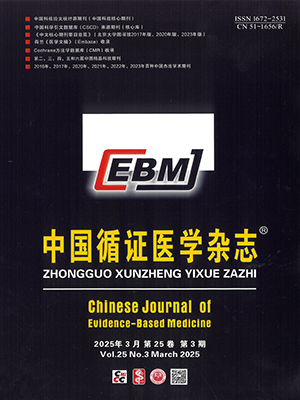| 1. |
Thacker SB. Meta-analysis. A quantitative approach to research integration. JAMA, 1988, 259(11) :1685-1689.
|
| 2. |
Greenland S. Quantitative methods in the review of epidemiologic literature. Epidemiol Rev, 1987, 9:1-30.
|
| 3. |
Dersimonian R, Laird N. Meta-analysis in clinical trials. Control Clin Trials, 1986, 7(3) :177-188.
|
| 4. |
Greenland S, Longnecker MP. Methods for trend estimation from summarized dose-response data, with applications to meta-analysis. Am J Epidemiol, 1992, 135(11) :1301-1309.
|
| 5. |
Berlin JA, Longnecker MP, Greenland S. Meta-analysis of epidemiologic dose-response data. Epidemiology, 1993, 4(3) :218-228.
|
| 6. |
Zheng W, Mclerran DF, Rolland B, et al. Association between bodymass index and risk of death in more than 1 million Asians. N Engl J Med, 2011, 364(8) :719-729.
|
| 7. |
Zhao W, Katzmarzyk PT, Horswell R, et al. Blood pressure and heart failure risk among diabetic patients. Int J Cardiol, 2014, 176(1) :125-132.
|
| 8. |
Li W, Katzmarzyk PT, Horswell R, et al. Body mass index and heart failure among patients with type 2 diabetes mellitus. Circ Heart Fail, 2015, 8(3) :455-463.
|
| 9. |
Bellavia A, Larsson SC, Bottai M, et al. Differences in survival associated with processed and with nonprocessed red meat consumption. Am J Clin Nutr, 2014, 100(3) :924-929.
|
| 10. |
Orsini N, Li R, Wolk A, et al. Meta-analysis for linear and nonlinear dose-response relations:examples, an evaluation of approximations, and software. Am J Epidemiol, 2012, 175(1) :66-73.
|
| 11. |
Orsini N, Bellocco R, Greenland S. Generalized least squares for trend estimation of summarized dose-response data. The Stata Journal, 2006, 6(1) :40-57.
|
| 12. |
Zhou Y, Tian C, Jia C. Association of fish and n-3 fatty acid intake with the risk of type 2 diabetes:a meta-analysis of prospective studies. Br J Nutr, 2012, 108(3) :408-417.
|
| 13. |
Crippa A, Discacciati A, Larsson SC, et al. Coffee consumption and mortality from all causes, cardiovascular disease, and cancer:a doseresponse meta-analysis. Am J Epidemiol, 2014, 180(8) :63-775.
|
| 14. |
Li S, Miao S, Huang Y, et al. Fruit intake decreases risk of incident type 2 diabetes:an updated meta-analysis. Endocrine, 2015, 48(2) : 454-460.
|
| 15. |
Xi B, Huang Y, Reilly KH, et al. Sugar-sweetened beverages and risk of hypertension and CVD:a dose-response meta-analysis. Br J Nutr, 2015, 113(5) :709-717.
|
| 16. |
Durrleman S, Simon R. Flexible regression models with cubic splines. Stat Med, 1989, 8(5) :551-561.
|




